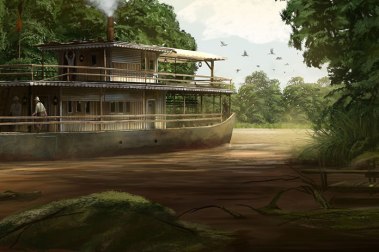
With finals going currently, here are some thoughts on novels, stories, and plays I used in my classroom over the last school year. It’s always interesting to experience something as a student and then as a teacher. Take Heart of Darkness: the dialogue is richer than what I remember from high school, and the novel is both funnier and more macabre than I ever knew. When Conrad writes about “the horror, the horror” of the Congo, he makes awful events seem absurd. It’s one way way to handle the fact that upwards of 15 million people were killed by Belgium’s African colonial endeavors, a fact many people even disputed as it happened.
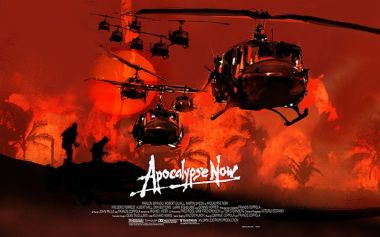
Hands down, Heart of Darkness is the most complicated and fascinating text I taught this year. Probably over half of it went over students’ heads as well (and a lot went over mine, still), which ultimately is fine—the novel contains multitudes and everyone got something out of it. As for similar, rich works, I read three Shakespeare plays with my students. The first was “Julius Caesar,” which I chose in part because I wanted to teach it alongside a great documentary called Caesar Must Die. It’s about Italian prisoners staging a production of the play, and though I found the last two acts of “Julius Caesar” very hard to get into, the unit worked well.

Here’s something you might not know about Shakespeare: all his plays are five acts long, and the climax always occurs in Act III. So “Julius Caesar” has a lot of high tension up until Caesar is stabbed in the exact middle of the play… and then it peters. As for the other two plays, I taught “Hamlet,” which also has an Act III climax. However, after Polonius gets stabbed behind the curtain, other acts have Ophelia dying, the queen dying, Laertes dying, the king dying, Hamlet dying, and Rosencrantz and Guildenstern dying. If you’re a high school student—or a regular twenty-first century adult, really—there is a lot to latch onto, which really keeps you going.
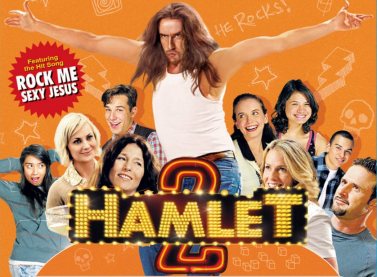
And “Othello” is just a classic; all easy-to-teach and great there. So moving on, in other classes I did a lot with The Call of the Wild. I last read this in middle school, and I was surprised by how “supernatural” it got. Or at least we could say London’s work is tinged by magical realism; Buck the dog eventually answers “the call,” the sounding of his primal, inner wolf, represented by visions of cavemen. As previously mentioned, I did a bit with “To Build a Fire,” also by London, and in an honors class we read the related “The Cremation of Sam McGee.” Initially I was worried my students wouldn’t think Robert Service’s Yukon poetry was funny, but in the end he was a big hit.
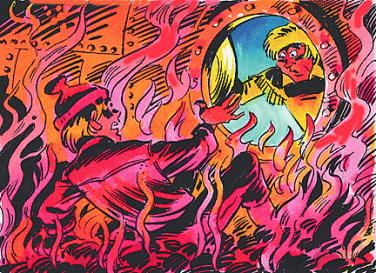
Subtlety in The Picture of Dorian Gray was lost in some ways. Oscar Wilde’s one-and-only novel is great, though more suited for older students, perhaps. Of Mice and Men was the hit that it always is, and it TRULY amazes me how many emotions are packed into this tiny novella. And last-but-not-least, “The Odyssey” impressed me more than anything else we studied, because it is simply so enjoyable. I think this was my fourth time reading it, and I could probably make a hundred blog posts praising Homer’s crowning achievement. Check it out when you have a chance, or at the very least, watch O Brother, Where Art Thou? which my students also loved.
–Jeff and Leah
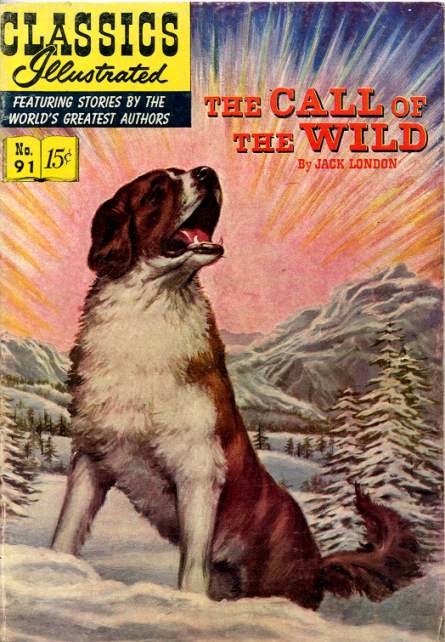

I think I missed a lot of readings in middle and high school. I remember reading “A Midsummer Night’s Dream” as far as Shakespeare went, but I don’t remember any others–maybe I blocked them out. Still, it appears that both you and your students learned much from your reading experiences this year.
If you could change it, what would you do differently as far as texts and pedagogy?
Also, do I seem like a Hamlet to you?
LikeLiked by 1 person
Oh wait, you and Hamlet?
LikeLike
Yeah, several people have compared me to Hamlet over the last, say, year and a half. It mildly baffles me.
LikeLiked by 1 person
I remember doing “Midsummer” in high school, barely. I’m so surprised by the things I have forgotten already about high school (or college)! I know we studying “Romeo and Juliet,” for example, but that’s only it — I know we did it, but I don’t remember doing it.
So maybe blocking? Ha ha. Thanks for the comments, and as far as change, yeah, I’d not teach “Julius Caesar.” It was a good experiment, but I’d probably do “King Lear” as a Shakespeare play instead. Also, Dorian Gray is a summer reading (at our school), and already it is getting changed to Lord of the Flies, which I think is an excellent choice.
In terms of pedagogy changes specifically, the big one I’ll need to implement is getting students to read more at home. I think it simply means more reading-check quizzes, which I don’t love, but, I had some troubles with getting some classes to read on their own time, which meant we had to cover more material in class. As a result, we ran out of time for other texts at the end of the year.
LikeLiked by 1 person
The blocking seems strong for everyone, then. I remember remembering doing “Romeo and Juliet” in grade 9, but I’m starting to think that remembering was a lie. I feel fortunate that I had summer reading of “Ender’s Game” and “Dune” for my time in high school. There must’ve been a sci-fi buff on that decision committee.
LikeLiked by 1 person
It was me on that committee. Time traveling. You’re welcome!
LikeLiked by 1 person
Pingback: Addendum: Texts I Taught This Year and EDGAR ALLAN POE – BATCH & NARRATIVE